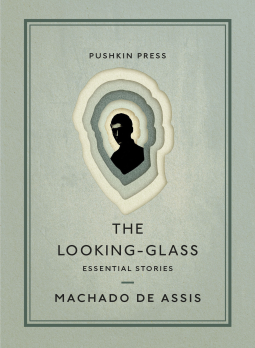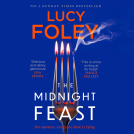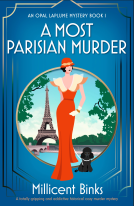
The Looking-Glass
Essential Stories
by Machado De Assis
This title was previously available on NetGalley and is now archived.
Send NetGalley books directly to your Kindle or Kindle app
1
To read on a Kindle or Kindle app, please add kindle@netgalley.com as an approved email address to receive files in your Amazon account. Click here for step-by-step instructions.
2
Also find your Kindle email address within your Amazon account, and enter it here.
Pub Date 13 Dec 2022 | Archive Date 21 Nov 2022
Pushkin Press | Pushkin Collection
Talking about this book? Use #TheLookingGlass #NetGalley. More hashtag tips!
Description
“Machado de Assis showed the human comedy is the same everywhere, and in conflicts between man and society, society usually wins.” --The New Yorker
Machado de Assis is one of the most enigmatic and fascinating story writers who ever lived. What appear at first to be stately social satires reveal unanticipated depths through flashes of darkness and winking surrealism. This new selection of his finest work, translated by the prize-winning Daniel Hahn, showcases the many facets of his mercurial genius.
A brilliant scientist opens the first asylum in his home town, only to start finding signs of insanity all around him. A young lieutenant basks in praise, but in solitude feels his identity fray into nothing. The reading of a much-loved elder statesman's journals reveals hidden thoughts of merciless cruelty.
This beautiful new collection of fresh translations offers the perfect gathering of his most beloved stories:
Available Editions
| EDITION | Other Format |
| ISBN | 9781782278078 |
| PRICE | US$18.00 (USD) |
| PAGES | 224 |
Featured Reviews
I haven’t read the two most well-known novels by Machado de Assis, Dom Casmurro and The Posthumous Memoirs of Brás Cubas, but this collection of short stories was a great starting point. It contains ten stories first published between 1881 and 1893 in a new translation by Daniel Hahn (2022).
I really enjoyed these stories (the only one I didn’t care for was The Canon), they were written in a sharp, precise way with dark and satirical undertones. The writing actually felt really modern and the storytelling made you want to read on and on. I would say, if you don’t want to read about animal cruelty, better to skip the story titled The Secret Cause as it has some horrific descriptions.
Thank you to NetGalley and Pushkin Press for the e-ARC.
 Carol C, Educator
Carol C, Educator
Fans of F. Scott Fitzgerald and Jane Austin will feel similar affection for the short stories of de Assis because he has a similar way of illuminating the psychological quirks of his characters. Also, the middle class and upper class people of Brazil in the late 1800s are shown to have had much the same socioeconomic concerns as the Industrial Age middle classes of London and New York.
Assis comments on notions of modernity, identity, and consensus reality in revelatory ways. Irony and satire combine in interesting ways. A consummate stylist, Assis nevertheless does not let a clever style get in the way of crafting instantly engaging, accessible, and memorable modern fables.
 Michelle Q, Reviewer
Michelle Q, Reviewer
I imagine it's not often that you can read an ARC collection of stories originally published between 1881 and 1893. Pushkin Press is publishing Daniel Hahn's translation of nine short stories and one novella by Machado de Assis on December 13th. Machado de Assis is considered the father of Brazilian literature and known as "the supreme black literary artist to date."
Have you heard of Machado de Assis? I hadn't so I was immediately interested. I also like to see gaps in my reading and I noticed I don't read a lot of translated classic fiction. Machado de Assis is considered the father of Brazilian literature and one of the best black authors in Western literature.
de Assis has a very unique way of writing. He uses an authorial voice in these stories (I'm a huge sucker for "Dear Reader") and he has a real flair for humour and absurdity. I loved that he shows the quirkiness of human nature and was very experimental - in “The Canon, or the Metaphysics of Style”, we are inside a character's brain and de Assis uses a lot of word play. I can't imagine how hard that would have been to translate!
I think this book, beautifully translated by Hahn, is a great introduction to Machado de Assis and I can't wait to read more of his work. Thank you to @netgalley, and @pushkinpress for the advanced reader copy of this book.
 Renee N, Librarian
Renee N, Librarian
I was pleased to be introduced to this great writer through this English translation from the Portuguese. The collected stories and novella include universal insights into human nature that seem very contemporary, though they were written in the late 19th century.
I will recommend this book to literature lovers based on the quality of the writing and philosophy of ideas. The stories range in style from realism to darkly romantic to experimental in style,, but all seem to focus on human entanglements.
The author is notably a self taught intellectual whose parents were freed slaves, and who lived at a time when slavery was still the norm.
 Helen S, Reviewer
Helen S, Reviewer
Thanks to the Pushkin Press Essential Stories series I’ve had the opportunity to explore the short stories of Herman Melville (a new author for me) and Fyodor Dostoevsky (an author I’d read before but only in full-length novel form). This latest collection has introduced me to another new author, the Brazilian writer Machado de Assis, who lived from 1839-1908. This book contains ten of his stories, translated from Portuguese into English by Daniel Hahn.
When trying a new author for the first time, you never really know what to expect, but since Joaquim Maria Machado de Assis (usually just referred to by his surnames) is described as one of Brazil’s greatest authors I thought he would surely be worth reading, even if the stories turned out not to be to my taste. Fortunately, I did find most of them quite enjoyable, providing lots of insights into the various sides of human nature. Although the stories were written more than a hundred years ago and on the other side of the world from me, they were still relatable because, of course, human beings aren’t really all that different, no matter where or when they lived.
The longest story in the book, which could probably be considered a novella, is The Alienist, in which Simão Bacamarte, a physician, opens an asylum in the town of Itaguaí. Bacamarte has a genuine interest in the new science of psychology and begins committing patients to the asylum so that he can study their symptoms. However, the numbers being admitted rapidly start to increase as it becomes clear that sane people are being sent there as well. Once most of the population of the town has been locked up and the others begin to rebel, Bacamarte is forced to reconsider his criteria for deciding who is sane and who is not, with surprising results!
Another story, The Stick, follows the story of Damião, a young man who escapes from a seminary and is afraid to return home because he’s convinced his father will send him back. Instead, he seeks the help of Rita, his godfather’s lover, who lets him stay in her house until the situation is resolved. Rita is a teacher of lacework and embroidery and has several young girls working for her. Damião discovers that one of them, a black slave called Lucrécia, is being badly treated and he must decide whether to intervene. I found this story interesting because Machado himself was the mixed-race grandson of freed slaves – and slavery was not abolished in Brazil until 1888.
Apart from The Canon, which describes a noun and an adjective searching for each other inside a man’s brain (too bizarre for me), I found most of the other stories intriguing in different ways. The Fortune-Teller, The Tale of the Cabriolet and Midnight Mass were some I particularly enjoyed. However, although I don’t usually include ‘trigger warnings’ in my reviews, I should mention that in The Secret Cause there are some graphic descriptions of animal cruelty which aren’t very pleasant to read!
At the end of the book, I was interested to read Daniel Hahn’s note on the translation where he explains why he deliberately tried to retain the 19th century feel of the original writing, even though this wasn’t necessarily the easiest option for a translator. I think this was the right decision – it worked for me and I found this collection a good introduction to the work of Machado de Assis.
Excellent collection of ten short stories by the Brazilian author. Clever, humorous, wry observations about human behaviour and also insights into the inner thoughts of his characters. My favourite stories were ‘The Stick’ about a young man who asks a woman friend of his godfather for help and then chooses not to protect a young girl because he needs the help of the woman; ‘The Posthumous Portrait Gallery’- a much respected man dies and his nephew discovers in his diary what he really thinks!; and the novella ‘The Alienist’ about a man who builds a town lunatic asylum and then tries to discover what madness actually is.
Classics can be a bit of a mixed bag for me. Some I love while others are simply ok and some leave me bored to tears. Fortunately,
The Looking Glass: Essential Stories by Machado de Assis falls into the first of these category. It was an easy read and I often found myself cracking a grin. Brazilian literature is not often widely read within the US and that seems a shame. Particularly so in this case because I feel that a lot of people could get a lot of enjoyment out of reading this collection of short stories.
...And because I'd very much like to have someone to tell me if I'm crazy for thinking the author wore a wry smile while writing them. There's such a delightful, dry sense of humor in the writing that I couldn't help it. It's very much a product of its time, but feels surprisingly modern in some parts. Perhaps that's why it held up so well for me.
My enjoyment was probably also due to the excellent translation. It's not easy to translate a work of literature and even less so to translate one written over a century ago, but Daniel Hahn managed to do so in a way that doesn't seem put of place. In the translator's note, he says that he tried to maintain an older voice without seeming a parody. I wouldn't consider myself an expert by any means, but I think he pulled it off.
My thanks to NetGalley and Pushkin Press.
 Reviewer 823951
Reviewer 823951
Simply stunning!Machado de Assis is one of the most enigmatic and fascinating story writers who ever lived. What appear at first to be stately social satires reveal unanticipated depths through flashes of darkness and winking surrealism. This new selection of his finest work, translated by the prize-winning Daniel Hahn, showcases the many facets of his mercurial genius.
A brilliant scientist opens the first asylum in his home town, only to start finding signs of insanity all around him. A young lieutenant basks in praise, but in solitude feels his identity fray into nothing. The reading of a much-loved elder statesman's journals reveals hidden thoughts of merciless cruelty.
This beautiful new collection of fresh translations offers the perfect gathering of his most beloved stories:
The Fortune-Teller
The Posthumous Portrait Gallery
The Loan
The Tale of the Cabriolet
The Stick
The Secret Cause
The Canon, or Metaphysics of Style
The Alienist
The Looking-Glass
Midnight Mass
 Marina S, Reviewer
Marina S, Reviewer
I haven't read any of these stories before, but I know some of them are available in other translations. Some of them are sly observational vignettes, some feel surprisingly modern, they all have endings that confound expectations (none of that ta-dah quality or sudden twist that you might expect from contemporary Western literature). I particularly enjoyed The Alienist, which has that slightly surreal humour and touch of exaggeration that became quite a staple in later Latin American literature.
This is a fine collection, an excellent new translation, and a thoroughly satisfying introduction to the work of Machado De Assis. The style is light, but with darker touches and undercurrents that will surprise and delight the reader. The tone is often formal and stately, but that often disguises, (or perhaps enhances?), the author's sly humor and often unexpected modern sensibility. A nice find.
 Mandy J, Reviewer
Mandy J, Reviewer
I’d heard the name but had never read anything by Machado de Assis and knew nothing about him, and now, thanks to this super volume from Pushkin Press I have rectified both gaps in my knowledge. Machado de Assis was a Brazilian novelist, playwright, poet and short story writer who is often regarded as the father of Brazilian literature. This collection of 10 stories, newly translated, is a great insight into his work and the society he was writing about, and I very much enjoyed reading them. Some I liked more than others, as is usually the case with such a collection, but they all at the very least intrigued and interested me, and some I found particularly sharp and satirical, and quite amusing. An excellent introduction to this relatively unknown writer.


















